British Writers and MI5 Surveillance, 19301960
Britains domestic intelligence agencies maintained secret records on many left-wing writers after the First World War. Drawing on recently declassified material from 1930 to 1960, this revealing study examines how leading figures in Britains literary scene fell under MI5 and Special Branch surveillance, and the surprising extent to which writers became willing participants in the world of covert intelligence and propaganda. Chapters devoted to W. H. Auden and his associates, theatre pioneers Ewan MacColl and Joan Littlewood, George Orwell, and others describe methods used by MI5 to gather information through and about the cultural world. The book also investigates how these covert agencies assessed the political influence of such writers, providing scholars and students of twentieth-century British literature an unprecedented account of clandestine operations in popular culture.
James Smith is Lecturer in English Literature at Durham University. Author of a critical study on the work of Terry Eagleton (2008), he has published widely in journals such as New Theatre Quarterly and Literature and History . He received his PhD from Cambridge in 2007.
CAMBRIDGE UNIVERSITY PRESS
Cambridge, New York, Melbourne, Madrid, Cape Town, Singapore, So Paulo, Delhi, Mexico City
Cambridge University Press
32 Avenue of the Americas, New York, NY 10013-2473, USA
www.cambridge.org
Information on this title: www.cambridge.org/9781107030824
James Smith 2013
This publication is in copyright. Subject to statutory exception and to the provisions of relevant collective licensing agreements, no reproduction of any part may take place without the written permission of Cambridge University Press.
First published 2013
Printed in the United States of America
A catalog record for this publication is available from the British Library.
Library of Congress Cataloging in Publication data
Smith, James, 1981
British writers and MI5 surveillance, 19301960 / James Smith.
p. cm.
Includes bibliographical references and index.
ISBN 978-1-107-03082-4 (hardback)
1. English literature 20th century History and criticism. 2. Politics and literature
Great Britain History 20th century. 3. Great Britain. MI5 History 20th century.
4. Intelligence service in literature. 5. Espionage, British History 20th century.
6. Right and left (Political science) in literature. I. Title.
PR478.P64s65 2012
820.9

3581dc23
2012023428
ISBN 978-1-107-03082-4 Hardback
Cambridge University Press has no responsibility for the persistence or accuracy of URLs for external or third-party Internet websites referred to in this publication and does not guarantee that any content on such websites is, or will remain, accurate or appropriate.
Preface
On 20 June 1940, George Orwell noted in his diary a particular fear circulating amongst many writers of his acquaintance. With the evacuation of Dunkirk having just occurred and the French surrender only days away, it seemed like the German invasion of Britain was imminent. This had obvious implications for those who had public reputations as left-wing writers and anti-fascist activists, and Orwell recorded:
I notice that all the left intellectuals I meet believe that Hitler, if he gets here, will take the trouble to shoot people like ourselves and will have very extensive lists of undesirables. C[yril Connolly] says there is a move on foot to get our police records (no doubt we all have them) at Scotland Yard destroyed. Some hope! The police are the very people who would go
Of course, the invasion did not occur, and Orwell was not shot because of records the police held, but his distrust of how Special Branch and other security agencies viewed left-wing intellectuals evidently remained. It rose to the surface again in December 1945, when he dedicated one of his Tribune columns to considering an incident that had
This book could be described as an attempt
separate folders (or pieces, as termed by the National Archives), covering the period from the official founding of the Secret Service Bureau in 1909 through to a cut-off point in the early 1960s, the point where the enforced fifty-year barrier of retention again draws the shutters on the archival trail.
Although such disclosures are a significant development, the files released to the National
Out of this range of material that has now appeared in the archives, it has frequently been the release of the records kept on prominent British writers and intellectuals that has sparked some of the most sensational newspaper headlines and consequently received), The maddening poet who slipped from MI5s grasp ( The Times ), and Auden suspected of helping Cambridge ring (the Daily Telegraph ) were just some of the headlines.
Such reporting served a useful function in drawing attention to MI5s archival releases on these authors but tended only to discuss elements of the files that directly lent themselves to the conjuring of a celebrity spy affair. However, when one looks in more detail within these specific files and the broader MI5 archive, it becomes apparent that a far more complicated interaction was taking place in this era. Auden and Orwell were just two of the many writers and intellectuals who, as a result of the political radicalisation that marked much of British culture of the 1930s, became involved with the political networks that were under surveillance by MI5 an agency that, in 1931, had been given a unique and powerful new mandate to pursue domestic subversion, and which, over the following decades, penetrated and documented Britains radical networks to an unprecedented extent.
It is the project of this book, therefore, to map this intersection and present a detailed study of the files that MI5 maintained on a pattern by which many of those previously regarded by MI5 and Special Branch as subjects of political suspicion actually came to be courted by other covert branches of the British state as credible assets in the emerging struggle for hearts and minds during the cultural Cold War.
As will be discussed in more detail in
Addressing this range of files, this study has pursued several overarching aims. The most direct task has been to piece together each fragmentary story that is the personal file of an individual writer, to understand elements such as what documents are actually in the file, why this individual came to security attention, the modes of surveillance deployed by securityintelligence agencies against this person, and the profile generated by intelligence officers when trying to interpret the activity of the writer. Given that detailed surveillance efforts will often have collected significant information that has otherwise been lost, the documents in an MI5 file frequently present a distinct biographical resource. Equally, the investigations and assessments of intelligence officers provide a silent coda to incidents and characters which sometimes feature in an authors published work, and thus I am interested in seeing how public literary writing and covert security assessments both entwine and conflict.
Beyond this, the book addresses several wider debates that these files raise. First, there is the question of what parallels or contrasts the archives of intelligence history have with the received literaryhistorical interpretations of this era. As will be seen, the focus of MI5s accounts often diverges from what the literary historian would expect. Some authors typically regarded as central to the left-wing culture of the decade were of comparatively scant interest to MI5, whereas other lesser-known individuals were observed with far greater attention, and some prominent examples of writing and activism were almost totally ignored by police and intelligence officers while others were recorded in detail. Consequently, in considering an era when the role and impact of radical writing was subject to acute and unprecedented debate by authors, the files of MI5 allow us to see where the British state security organs actually judged the potential political impact of such literary activism to be.

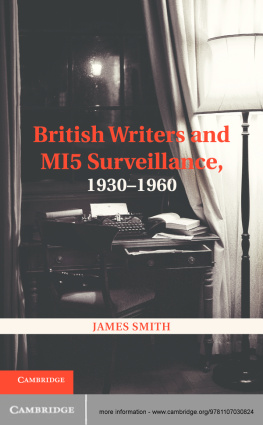





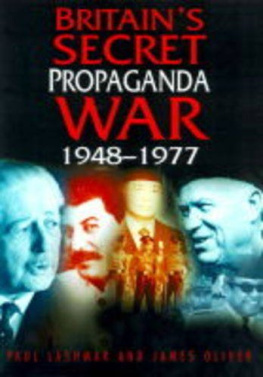
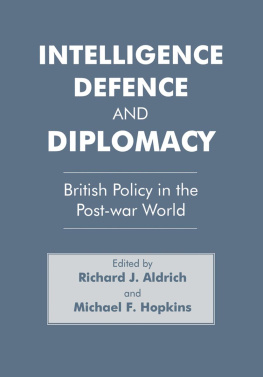
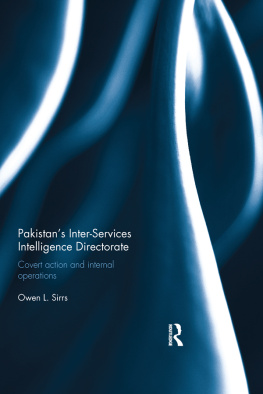
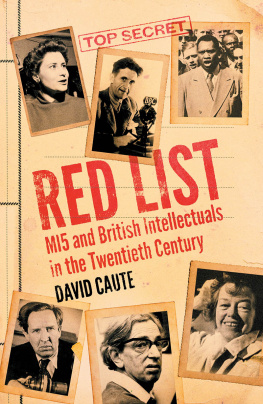
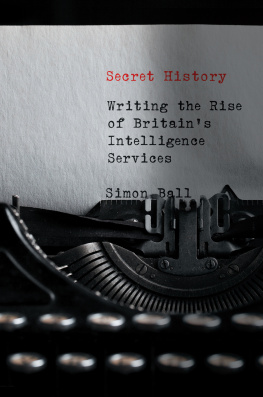
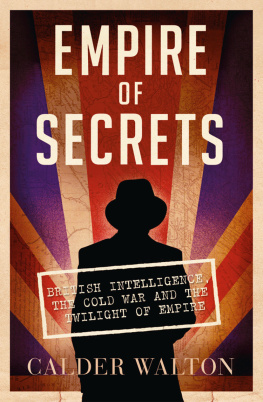
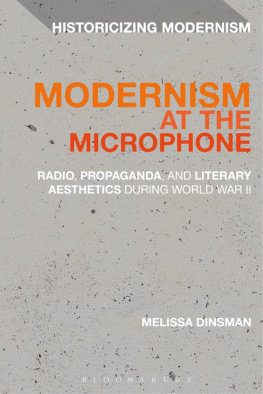

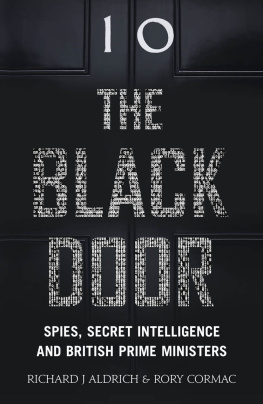
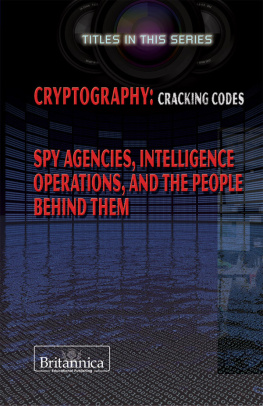
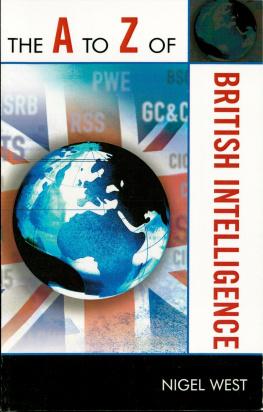

 3581dc23
3581dc23